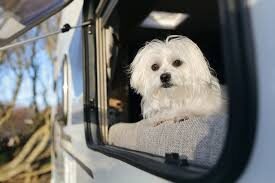What Does UK Law Say About Pets in Vehicles?
The Highway Code and the Animal Welfare Act 2006 are the two main frameworks that apply when transporting animals.
Rule 57 of the Highway Code:
“When in a vehicle, make sure dogs or other animals are suitably restrained so they cannot distract you while you are driving or injure you, or themselves, if you stop quickly.”
Suitable restraints include:
- Pet seat belts or harnesses
- Crates or carriers
- Dog guards or pet barriers
- Driving with an unrestrained pet may not directly lead to prosecution under the Highway Code, but if it causes an accident or distraction, you could face penalties under careless or dangerous driving laws. Insurers may also refuse to pay out on claims if the pet was unrestrained at the time of an accident.
-
What Are the Risks and Penalties?
- Driving without proper pet restraint
Could be classed as careless driving, with fines up to £5,000, penalty points, or even disqualification. - Allowing a pet to hang out of a window
May lead to a fine for dangerous driving or animal welfare breaches. - Leaving a pet in a hot vehicle
Can be prosecuted under the Animal Welfare Act 2006 for causing unnecessary suffering. - Fun fact: A dog weighing 20kg can be projected with a force of over 600kg in a 30mph crash. That’s the same weight as a small motorbike!
-
Hot Weather Warning: Don’t Leave Pets in Parked Cars
Even on a mild 20°C day, the inside of a car can reach 40°C+ in under 10 minutes. Dogs can suffer from heatstroke or death in a very short space of time.
- If you wouldn’t sit in your vehicle without air conditioning — your pet shouldn’t either.Police and RSPCA officers regularly respond to calls about dogs in distress in parked vehicles. If an animal is visibly suffering, breaking the window to rescue them can be legally justified under certain circumstances.
-
Best Practice for Pet Travel Safety
Here’s how to keep your pets safe — and stay on the right side of the law:
- Use a crash-tested pet harness, crate or guard
- Never allow pets to sit on your lap or roam freely
- Avoid letting pets stick their head out the window
- Ensure proper ventilation and frequent stops on long journeys
- NEVER leave pets in a parked vehicle unattended
- Keep pet essentials (water, lead, poo bags, ID tags) within reach
-
For Caravanners & Trailer Users
If you’re towing a caravan or trailer, plan your journey with pet safety in mind:
- Dogs should travel inside the main vehicle, not the caravan or trailer
- Ensure your crate or harness is securely anchored
- Check DEFRA rules if travelling with pets to Ireland or Europe
- If using a pet trailer or box trailer, ensure it meets Construction and Use regulations
-
What to Do If You See a Pet in Distress
If you spot a dog left in a hot car, dial 999 immediately. The police have the authority to act fast to prevent suffering. You can also report incidents to the RSPCA cruelty line on 0300 1234 999.
-
Final Thoughts
Pets are family, and their safety matters just as much as ours on the road. Make sure you understand your legal responsibilities and take simple steps to prevent injury or distress.
At Towing Solutions, we’re committed to promoting safe, legal and responsible towing and travel practices. Whether you’re a pet-loving caravanner or a commercial driver transporting animals, we’re here to help you stay informed and compliant.
-
🔗 Related Links
- RSPCA: Pets in Hot Cars Advice
- Highway Code Rule 57 – Gov.uk
- Towing Solutions – Caravan Towing Courses
- Towing Safety for Pet Owners – Free Guide (PDF)
- Share this post:
Facebook | X (Twitter) | LinkedIn | Email Want more tips on safe towing and travel?
Sign up to our newsletter
